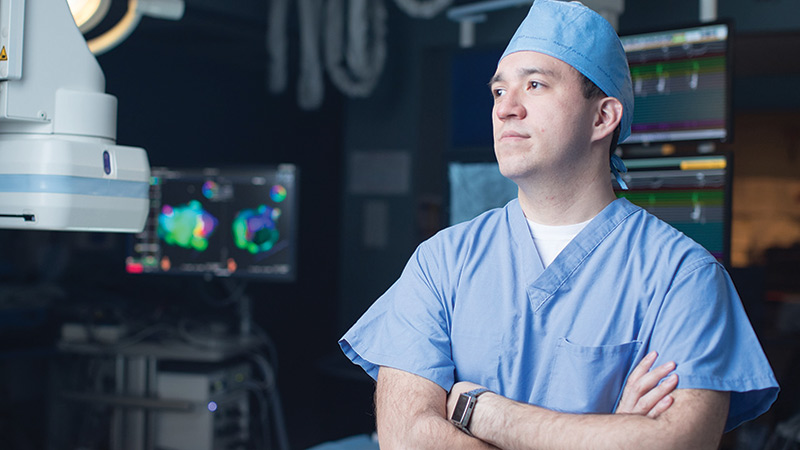Don’t miss a beat with AFib

Brought to you by MERCY HEALTH
The mission of Mercy Health has remained steadfast since the Sisters of the Humility of Mary began providing health care services more than 100 years ago. Mercy Health’s core values of compassion, excellence, human dignity, justice, sacredness of life and service are upheld at all of our care locations, blending pioneering technology and innovative equipment to provide the best care possible.
Visit mercy.com for more information or to find a doctor, location or specialty.
When strumming on a guitar, missing one chord can cause a musical symphony to go astray. The same applies to the “symphony” of your heart, where misfiring or unsynchronized heartbeats can cause serious medical issues.
Atrial fibrillation, or AFib, is in essence when the electric system of the upper and lower chambers of the heart are “not working well together,” said Dr. Allen Amorn, Mahoning Valley native and Mercy Health – Youngstown cardiologist.
The upper chamber quivers and doesn’t beat in a coordinated fashion, which throws off the timing of the heart pumping and closing of valves.
It is estimated that more than 2.5 million Americans suffer from AFib, with approximately 160,000 new cases each year.
Dr. Amorn specializes in cardiac electrophysiology and continues to see a growing trend with patients suffering from AFib.
“This is becoming one of the most common cardiac conditions that people are seen for in the ER, as well as in the clinic,” Dr. Amorn said. “It’s a true epidemic in terms of cardiac conditions.”
Heart palpitations are among the most common symptoms of AFib. Others include tiredness or fatigue, ongoing and intermittent shortness of breath, chest discomfort or tightness, and dizziness or fainting.
Some patients with AFib do not experience any symptoms at all, and may only find out through their annual exam with their primary-care doctor.
AFib can lead to stroke or heart failure if it goes unnoticed or unattended. And here’s a fact that might get your heart racing: a person with AFib is five times more likely to suffer a stroke than someone without it.
Treatment focuses on normalizing the heart rhythm, preventing blood from clotting and decreasing risk of stroke or heart failure. For many cases of AFib, medications and blood thinners are used.
For some cases however, catheter ablation can be very helpful. This involves using flexible catheters to target areas inside the heart where AFib tends to trigger from. Catheter ablation options include: radiofrequency ablation, which uses a heating element to burn those areas; or a cryoablation option, which takes a freezing approach.
For those who can’t take blood thinners, an additional procedure is available called left atrial appendage occlusion. Using a small umbrella-like device, areas of the heart are blocked where blood clots may come from.
Outside of medication and surgical procedures, you can minimize or avoid AFib by maintaining a healthy weight, exercising, avoiding tobacco, using alcohol in moderation, controlling blood pressure, diabetes and cholesterol, and treating sleep apnea, which can be an unrecognized contributor of AFib.
Offering a close-to-home comprehensive care approach and state-of-the-art technology, Mercy Health – Youngstown is the only medical center in the Mahoning Valley that offers catheter ablation to treat AFib. Mercy also has a cardiac surgical team that provides AFib care along with valve disease care.
With National Atrial Fibrillation Awareness Month taking place throughout September, Dr. Amorn stresses the importance of taking potential AFib symptoms seriously.
“Early diagnosis and treatment are key to maintaining a high quality of life,” he said.
For more information on atrial fibrillation treatments and services, visit Mercy.com or call 330-965-3363.
 43
43
